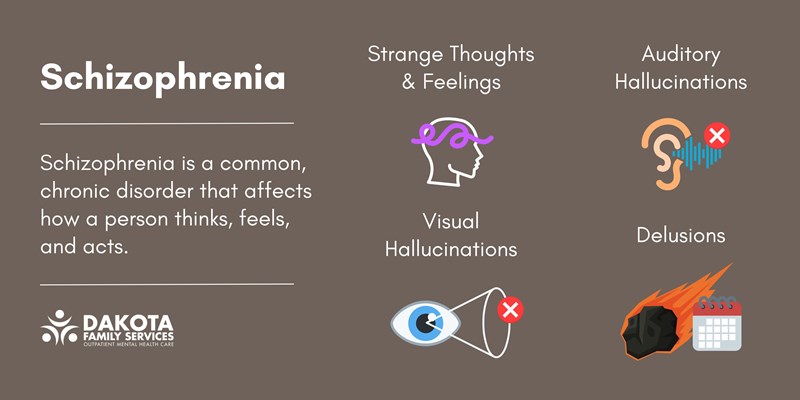Schizophrenia
Definition
Schizophrenia is a serious mental illness that affects how a person thinks, feels, and acts. People with schizophrenia experience unusual or strange thoughts, feelings, and behaviors that can put them, their family members, and their friends in distress. They may have difficulty distinguishing between the real world and imaginary thoughts or experiences, which can make it difficult to plan and carry out daily activities or make decisions.
Key Things to Know About Schizophrenia
- People with schizophrenia are usually diagnosed between the ages of 16 and 30, after the first episode of psychosis.
- People with schizophrenia often have problems learning, paying attention to details, solving problems, remembering things, speaking clearly and appropriately for the situation, and making good decisions.
- Starting treatment as soon as possible following the first episode of psychosis is an important step toward recovery. With the right treatment, many people with schizophrenia are able to live normal lives.
Treatments Include:
- Medication
- Psychotherapy
- Group therapy
- Family therapy
- Psychiatric care
Common Myths About Schizophrenia
Myth #1: Schizophrenia is a life sentence.
While there is no cure for schizophrenia, symptoms can be managed with medication and psychosocial treatment, allowing many people to lead fulfilling lives. The earlier you get help, the better your chances of recovery.
Myth #2: All people with schizophrenia are violent or dangerous.
The vast majority of people with schizophrenia do not commit violent crimes. However, they may experience delusions or hallucinations that make them feel paranoid or anxious–and these feelings can lead to aggressive behavior towards others or themselves.
Myth #3: Schizophrenia means split personality.
People with schizophrenia don’t have split personalities—they experience hallucinations and delusions. It’s true that people with schizophrenia sometimes hear voices or see things that aren’t there, but those hallucinations tend to be very different from someone with multiple personalities. In fact, most people with schizophrenia don’t hear voices at all.
Myth #4: Schizophrenia is caused by bad parenting or childhood trauma.
We do not yet understand how genes might cause schizophrenia, but research suggests that one or more genes may be involved in its development. However, studies show no evidence that childhood trauma or bad parenting lead to schizophrenia.
Myth #5: Schizophrenia is rare.
Schizophrenia affects around 1 in 100 people at some point in their lives, making it one of the most common forms of serious mental health conditions in the U.S.
More Resources:
- National Alliance on Mental Health (NAMI) - Contact the NAMI HelpLine at 1-800-950-6264 or info@nami.org for support and resources.
- Substance Abuse and Mental Health Services Administration (SAMSHA)
- Schizophrenia Resource Center (American Psychiatric Association)


